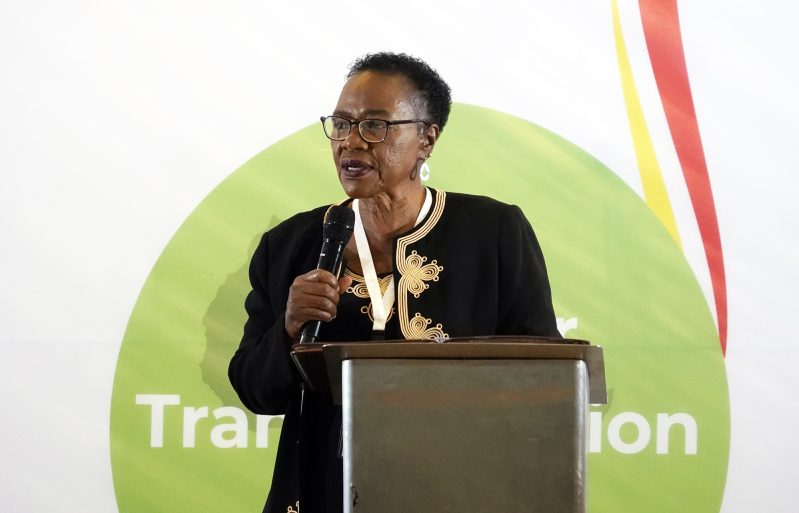
At the 13th General Assembly of the Association of Evangelicals in Africa (AEA) on May 23, 2025, Professor Marvelous Mhloyi delivered a sweeping and impassioned address on gender and sexuality, focusing particularly on homosexuality and the church's biblical mandate in response to growing Western influence.
A seasoned academic and Christian leader, Mhloyi holds a Ph.D. and M.A. in Demography from the University of Pennsylvania, alongside degrees in social sciences and biblical studies. With more than 36 years of experience teaching demography and conducting public health research across Africa, she brought both scientific rigor and theological grounding to one of the Assembly's most sensitive and pressing topics.
Biblical foundations and gender clarity
Opening her remarks with a call to align with the "supreme authority" of Scripture, Mhloyi distinguished between gender as a fluid social construct and sex as a biological, God-given reality. “Sex is permanent,” she stated. “God created them male and female. That remains unchanged.”
Drawing on Genesis and Pauline epistles, Mhloyi affirmed the spiritual equality of men and women within the body of Christ, noting that both genders receive salvation, the Holy Spirit, and spiritual gifts without distinction. However, she stressed that sexual relations were biblically confined to heterosexual marriage.
“The biblical model for sex is one man, one woman, in covenant marriage,” she said. “This is not a cultural view. It is a divine command.”
Mhloyi critiqued the expansion of LGBTQIA+ identities, which she said originated from secular rights discourses during the HIV/AIDS pandemic. She warned that the normalization of these identities poses not only moral but demographic and health-related risks.
Referencing Leviticus and Romans, she stated: “Homosexuality is a sin. It deviates from God’s design for human relationships.” She argued that African churches should not compromise on this point, even amid global pressure.
“Let us not be passive recipients of Western paradigms,” she said. “The African church must stand as the voice of the world and not accept foreign norms that undermine the Word of God.”
Mhloyi described Western advocacy for same-sex relationships as a form of cultural imperialism, warning that it could erode Africa’s moral and spiritual foundation. She urged the church to guard against the infiltration of ideologies disguised as human rights.
Addressing demographic realities
Using her expertise in demography, Mhloyi presented data linking the societal acceptance of homosexuality to demographic decline. Citing Pew Research and fertility statistics, she highlighted that countries with the highest acceptance of same-sex relationships also have the lowest birth rates and aging populations.
“A society that embraces non-procreative sexual norms is a society on a path to demographic extinction,” she said. “Africa must not follow suit.”
She pointed out that most African countries with strong opposition to homosexuality have total fertility rates above replacement level, ensuring population sustainability. In contrast, countries such as Spain, Germany, and Italy — where public support for homosexuality is high — are experiencing severe fertility decline.
Mhloyi also cited public health research associating homosexual activity with increased disease risk, including hepatitis, intestinal parasites, and reduced life expectancy among men who have sex with men. While acknowledging these are sensitive topics, she insisted they must be addressed honestly.
“We cannot ignore the data,” she said. “This is not just a theological issue. It is a public health issue and a demographic issue.”
“Who speaks for the child?”
Mhloyi questioned the ethics of same-sex parenting and adoption, arguing that children have a right to be raised by a mother and father. “Two women or two men cannot replicate the model given by God,” she said. “We must consider the rights of children who are adopted into same-sex households.”
She argued that such children are often the victims of poverty or social displacement, and that placing them in same-sex households undermines the biblical family model and introduces confusion.
“The world speaks of the rights of same-sex couples,” she said, “but who speaks for the child? What is the model they are shown? What will they carry into their future?”
Mhloyi accused some scientists of overstepping their bounds by attempting to discredit spiritual truths. “Spiritual reality is not subject to scientific proof,” she said. “Science did not create truth. God did.”
While affirming the value of science in medicine and research, she warned against its misuse to justify behavior the Bible calls sinful. She noted that the claim “I was born this way” is often used to excuse sexual immorality, but moral accountability remains.
“If a person were born with a propensity to steal or kill, would society excuse the behavior?” she asked. “Sin is not justified by inclination. It must be confronted with truth.”
The influence of donor funding and the silence of the Church
Mhloyi also drew attention to the influence of Western funding on African churches and policy-making. She claimed that foreign aid, tied to sexual rights advocacy, has compromised the ability of some Christian leaders to speak out.
“We must not serve both God and mammon,” she said. “The love of money has removed the church from its position as the moral voice of society.”
She warned that foreign funding of HIV programs and rights-based initiatives often came with implicit expectations of ideological alignment, including acceptance of same-sex relationships. This, she argued, was a form of neocolonialism.
Mhloyi criticized the church for often remaining silent on issues of sex and sexuality, allowing secular narratives to dominate public discourse. “The Church must break the culture of silence,” she said. “We must teach the godly way, and we must do it with courage.”
She called on churches to equip pastors with theological and pastoral tools to address sexual issues, including same-sex attraction, from a biblical perspective that also extends grace.
“Condemnation is not our goal,” she said. “Transformation is.”
Throughout her address, Mhloyi returned to the authority of Scripture. She quoted from the Old and New Testaments, including Leviticus, Romans, and Corinthians, to reinforce the biblical prohibition of same-sex relationships. “What God has joined together – male and female – let no one separate,” she said.
She also challenged African theologians and churches to take responsibility for shaping Christian discourse rather than relying on imported ideologies. “Missionary work must now be reversed,” she said. “It is time for Africa to speak to the world.”
Not only a faithful but a prophetic African Church
Beyond the question of sexuality, Mhloyi addressed gender roles in church leadership and service. She pointed out that women constitute the majority of church members in Africa, yet remain underrepresented in pastoral leadership.
“Women are the caregivers, the counselors, the workers of compassion,” she said. “But too often they are excluded from the decision-making table.”
She advocated for proportional representation of men and women in all levels of church hierarchy, not as a nod to feminism, but as a theological affirmation of the gifting of all believers.
Concluding her address, Mhloyi warned of judgment for churches that accommodate sin or remain silent in the face of moral compromise. “If we tolerate same-sex relationships, we make them church-sanctioned sins,” she said. “And for that, we will be held accountable.”
But she also offered hope. “God is waiting for repentance. He forgives. He restores,” she said. “Let us preach that truth boldly, in love, and without fear.”
“Let us prepare the Church in Africa to be not only faithful, but prophetic,” she said.






